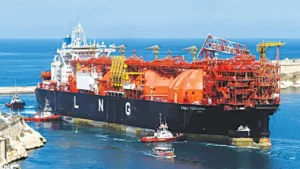The globe now faces the terrible truth of climate change, with developing economies at its center of destruction. Historically, more industrialized nations in North America and Europe have contributed to the rise in global temperatures than have less developed nations, but it is the latter who are bearing the brunt of the consequences. An iconic instance were the flash floods that Pakistan experienced in 2022 due to climate change.
The new wave of trade protectionism that appears to be arising, with the US and the EU in the head of many of these energy battles, is adding fuel to the fire of climate change. Pakistan’s efforts are being negatively impacted by growing trade tensions as it struggles with climate-related calamities. But these difficulties brought about by US-EU trade policy related to climate change might also be vital requirements.But these obstacles presented by US-EU climate-linked trade policies might also be vital requirements for Pakistan to seize the chance to advance toward constructing climate resilience.
The Carbon Border Adjustment Mechanism (CBAM), a component of the larger European Green Deal and the fit for 55 strategy, has started to be phased in by the EU. The CBAM requires businesses importing goods into the EU to declare their emissions in an effort to stop “carbon leakage.” This system, which is scheduled for complete implementation by 2026, will apply to all countries, even the least developed ones. In contrast, imports from these countries were granted tariff- and quota-free access under the EU’s Everything except Arms (EBA) scheme.
The competitiveness of Pakistan’s companies on the global scene is the country’s top priority. Over the next ten years, the cost of goods produced by Pakistan’s export industries particularly those that depend on coal-based power will increase dramatically if large investments are not made in sustainable and renewable energy. This is especially crucial because renewable energy is increasingly being used as a trade barrier by the EU, which is Pakistan’s second-biggest trading partner and the largest destination within the bloc for its exports.
Cement, aluminum, hydrogen, iron and steel, fertilizer, and power were the first six sectors that the CBAM focused on. However, it will now cover all industries, including textiles, which account for the majority of Pakistan’s exports. It is imperative that Pakistani exporters comprehend the timetable and potential duties associated with the CBAM as it moves closer to full implementation.
The carbon price that the EU must pay will be determined by the carbon price in the nation of origin as well as the carbon content of the goods. This calls into doubt the capacity of Pakistani businesses to quantify, record, and validate emissions as well as the relative carbon intensity of their products in relation to rivals. In order to lessen these difficulties, Pakistan’s domestic policy may need to include carbon pricing.
In addition, worldwide consumer preferences are changing in favor of sustainability, emphasizing the reuse and recycling of textiles. EU eco-design regulations are driving exporters to create sorting and recycling centers, reduce the amount of textiles that are destroyed when unsold or returned, and reduce the environmental impact of production processes. Pakistani exporters will have to make available to the public the extent of product damage.
Although diversifying the market may help to offset some losses, it runs the risk of pushing Pakistan further behind the rest of the world in the sustainability movement, which could impede its green progress. Producers headquartered in the EU may also be impacted by the strict compliance costs, which might create a complex dynamic and serious hazards for Pakistan’s sustainable economic development a perfect storm for the dependency hypothesis.
Pakistan needs to balance its export strategy with strong investments in renewable energy and environmental practices to remain resilient and competitive, but this can only be done once the full geopolitical picture is known.
The 2022 passage of the US Inflation Reduction Act (IRA) has become central to the transatlantic debate over green technologies and electric cars (EVs). This program seeks to achieve a 60% carbon-free power sector by 2032 and is intended to encourage investments in green technologies and climate change through tax credits and subsidies. Its focus on strengthening American manufacturing and U.S. energy security, however, has drawn criticism from around the world, especially from South Korea, Japan, and India, who are thinking about taking reciprocal protectionist measures.
The International Renewable Energy Agency (IRA) may provide serious obstacles to Pakistan’s energy transition and involvement in the global green economy. The IRA’s tax credits and subsidies are targeted at U.S. domestic sectors, similar to the CBAM’s assistance for EU domestic industry, which results in an overabundance of green technology prices, undermining the competitiveness of manufacturing in Pakistan and other developing nations.
The manufacturing sector in Pakistan may find it difficult to keep up with the cost savings and technological breakthroughs brought about by IRA-supported projects in the Global North, making this a particularly troubling position for them. Due to its steadfast dedication to its green agenda, the EU has made few concessions to its foreign allies, which may lead to a rise in trade disputes and allegations of protectionism. Pakistan might be compelled to look for markets in the Middle East, China, and India that have laxer environmental laws.









